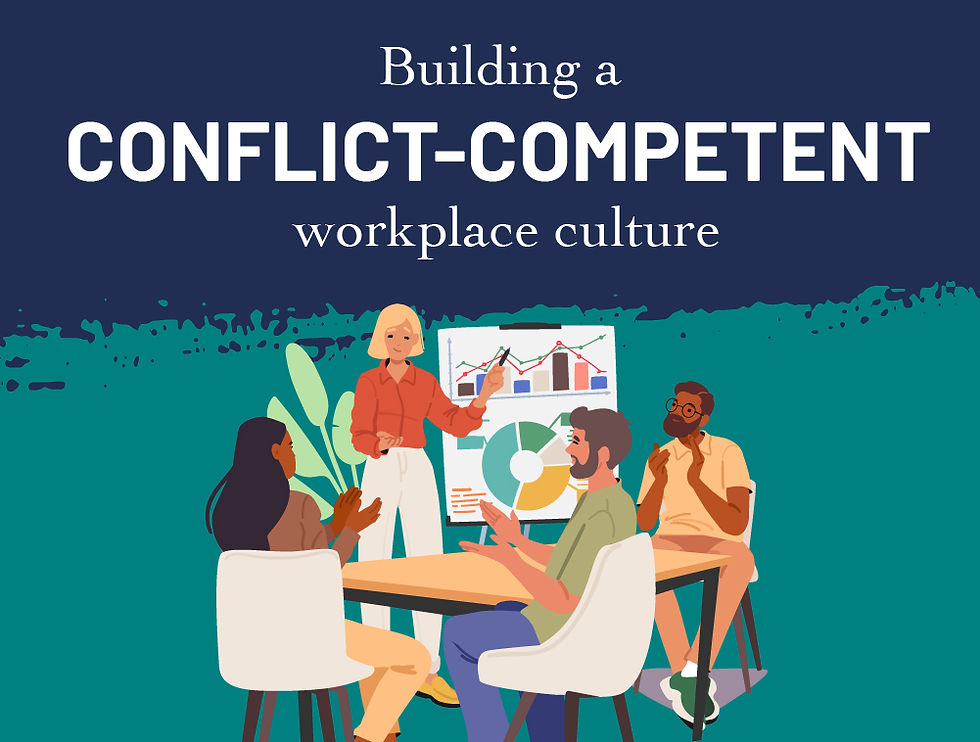Who Do You Choose to Be?
- Dr. Robyn Short

- Jan 5, 2022
- 3 min read
Updated: Oct 16, 2022
By Robyn Short, President & CEO, Workplace Peace Institute
Reimagining organizations by devising an innovative model that encourages productive, fulfilled, and engaged employees.

We are living in a time of unprecedented change filled with political, social, and environmental disruptions that affect us all. Amid the backdrop of rising CO2 emissions, warming oceans, extreme weather events, and steadily rising atmospheric temperatures, we enter year three of a global pandemic. People are rightfully fearful and this emotion is expressing itself as anger, anxiety, distress, and, for some, even desperation. As a result, we are experiencing a widespread crisis in mental health as people reach their capacity for enduring near-constant stress. These are the realities facing every organizational leader.
The Great Resignation is showing no signs of slowing down. According to new data from the Department of Labor an estimated 4.5 million workers quit or changed jobs in November 2021. People are tired, and they are leaving jobs for their own sanity.
Not one of us, as individuals or leaders in our chosen fields, communities, or organizations, will be able to change the way the world is. I agree with Buddhist teacher Chögyam Trungpa:
"We cannot change the way the world is, but by opening to the world as it is we may discover that gentleness, decency, and bravery are available, not only to us, but to all human beings."
To retain the talent necessary to solve increasingly complex challenges, we need leaders who embody gentleness, decency, and bravery. We need organizational paradigms that cultivate the ability for individual contributors and managers to listen and speak to one another openly and transparently. We need leaders who hire diverse teams and work effectively with them. We need all people, regardless of title or role, to have access to one another and to be trusted with open and transparent information. We need organizational values that are well defined, known by all, and consistently used as the foundation from which all work is performed. We need collaboration to be deeply valued, implemented, and expected. And, importantly, we need honesty.
Our current organizational paradigms are not designed for these behaviors. Traditional leadership styles were born out of the Newtonian concept that force must be applied in order to achieve motion and that the amount of force applied is directly proportional to the amount of movement achieved. These systems of coercion and dominance are familiar to us all. For many, they may very well be a reflex originating from our families of origins. If the parental phrase, “Because I said so” sounds familiar, then count yourself among this group.
I firmly believe that top-down, hierarchical, traditional leadership is playing a significant role in the Great Resignation. This type of leadership fails to consistently harness the wisdom, creativity, and capacity for innovation that lives inside every organization. It consistently fails to sustain employee engagement — the most critical aspect of a thriving workplace. Traditional leadership approaches are especially harmful toward employees of color, LGBTQIA+ employees, and women of all ethnic identity groups.
To embody gentleness, decency, and bravery, leaders must learn a new way of being and act from an entirely new set of skills. I have identified three categories of skills that are essential for leading in this time of disruption and constant change: leadership intelligences, communicating with curiosity and dignity, and advanced conflict resolution skills.
As leaders, we must humbly accept that our previous work experiences, academic learning, and workplace training was designed to perpetuate the status quo.
The status quo is quite literally killing the planet, decimating communities, and devastating our workplaces. We were not adequately prepared for creating a workplace that is capable of caring for people as the world collapses around us. We need new learnings and new skills to lead with compassion and dignity and restore sanity in the workplace.
In her book, Who Do We Choose to Be?: Facing Reality, Claiming Leadership, Restoring Sanity, renowned leadership consultant Margaret Wheatley writes: “Several years ago, in the face of irreversible global problems and the devolution of leadership, I began to challenge every leader I met with these questions: Who do you choose to be for this time? Are you willing to use whatever power and influence you have to create islands of sanity that evoke and rely on our best human qualities to create, produce, and persevere?”
And so, I ask you, will you choose gentleness, decency, and bravery? Will you choose to reimagine leadership so you can cultivate a workplace in which all people can thrive? When you are ready, our team at Workplace Peace Institute is here to support you.
Dr. Robyn Short is the president and CEO of Workplace Peace Institute – an organizational systems design and research firm that is singularly focused on creating workplace cultures where people thrive. Workplace Peace Institute supports small to mid-sized businesses in optimizing employee engagement, maximizing organizational productivity, and improving profitability by infusing human security and dignity as foundational attributes of their business model.


